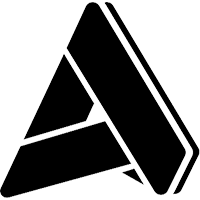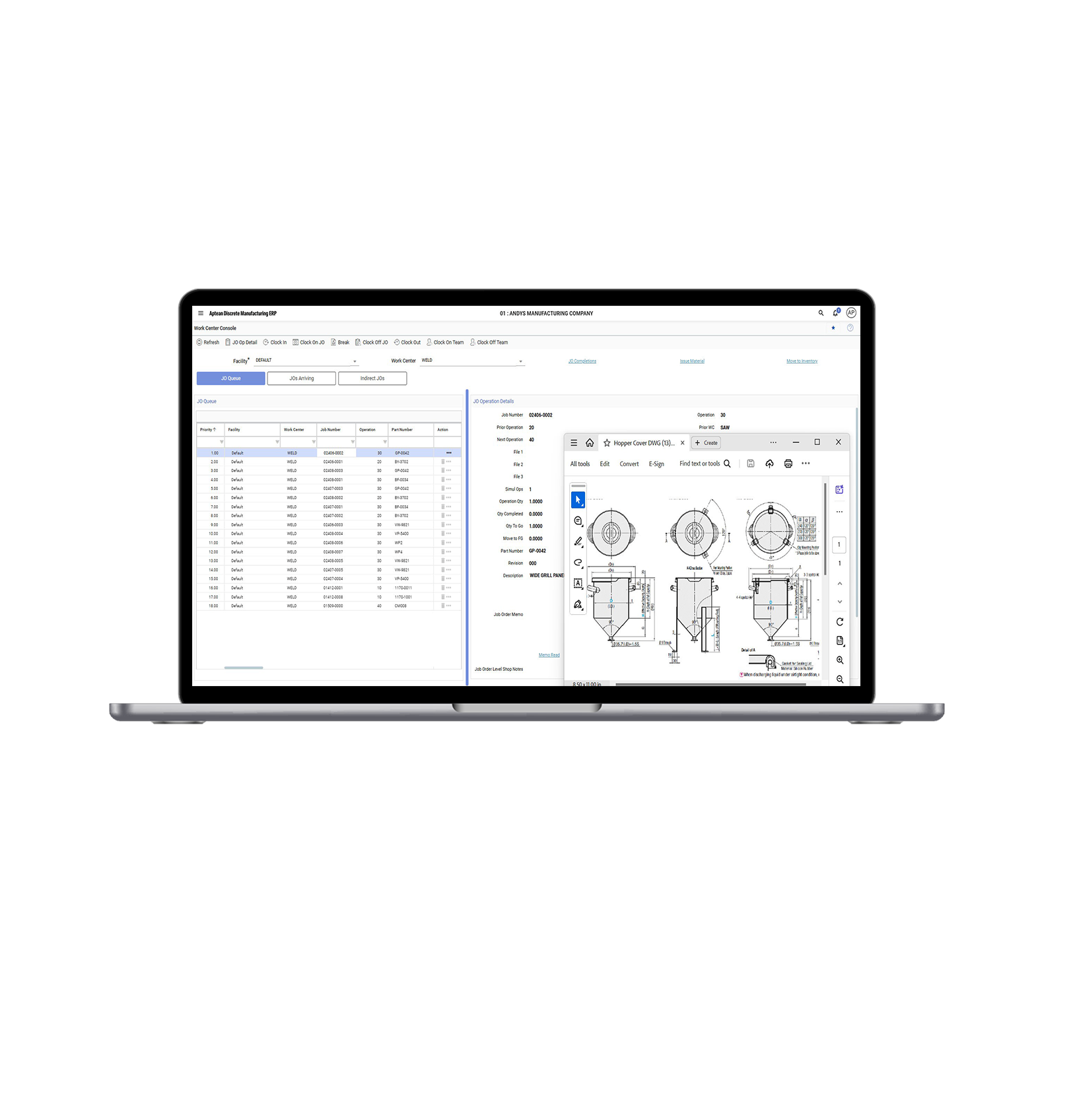ERP for Discrete Manufacturing: Key Features That Drive Success in Every Team
ERP for Discrete Manufacturing: Key Features That Drive Success in Every Team
ERP for Discrete Manufacturing: Key Features That Drive Success in Every Team
3 Jul 2025
 Aptean Staff Writer
Aptean Staff Writer 
Let's talk about your success in the manufacturing world. It's all about being efficient and agile, right? From managing supply chain partners and customer requirements, to controlling shop floor processes and operational costs, every part of your operation requires precision. That kind of complexity means everyone on your team, from the folks on the floor to the execs in the corner office, needs tools that work just as hard as they do. An enterprise resource planning (ERP) system remains the strongest solution to provide those features.
But today, even the best ERP systems need an edge. That's where you need artificial intelligence (AI) embedded into your platform—unifying business operations, surfacing real-time insights, automating repetitive tasks and helping your teams move faster. Getting ahead of AI integration in manufacturing is going to be the difference between the winners and the losers in Industry 5.0. According to recent research, the top three benefits of implementing AI in manufacturing are better efficiency and productivity, improved product quality, and enhanced innovation and development capabilities.
Still, AI alone isn’t enough. A generic, one-size-fits-all system won’t cut it in a specialized environment like discrete manufacturing. You need a purpose-built ERP solution that combines next-gen AI capabilities with deep, industry-specific functionality. So instead of trying to make generic features work for your business, you get targeted tools that fit like a glove. And that means fewer headaches, smoother workflows and better decisions across the board.
Let’s break it down by role. In this blog, we’ll show you exactly how an ERP for discrete manufacturing adds value for your teams—from the shop floor to the sales floor. You’ll see how industry-specific, AI-powered ERP software helps streamline operations, boost customer service, improve quality and keep your business moving like a well-oiled machine.
ERP Features for the Shop Floor Team
Let's start with the heart of your operation: the shop floor. Whether you're assembling HVAC units or machining auto parts, your team needs real-time visibility and intuitive tools to do their best work. That’s where real-time production monitoring and floor execution tools come in. These features give you an instant snapshot of everything in motion—new jobs, work-in-progress and completed operations. Supervisors can instantly track labor, material and machine usage as it happens. No guesswork, no delays, just crystal-clear visibility.
But visibility is just the start. The system also helps your teams stay flexible when things shift—because, let’s face it, they always do. With dynamic rescheduling tools and accurate shop calendars, managers can adjust workloads based on current priorities. You’ll also get real-time status reports for every shop order, complete transaction histories and the ability to drill down into the nitty-gritty of each activity. Whether you’re managing shift schedules or calculating actual operation hours, everything is built to keep your floor efficient and in sync.
And for your team on the ground, the system has got the good stuff—like barcoded shop packets, automated drawings and work instructions, and backflushed materials tied to specific operations. What’s more, simple touch screens and automated processes simplify tasks like clocking in and out, material movement reporting and word order completion for your operators. With the most advanced systems, your shop floor teams benefit from seamless coordination between ERP, shop floor execution and equipment maintenance when integrated with AI. All of this translates to fewer disruptions, more uptime and a tighter grip on every step of the build process.
ERP Features for Engineering
Your shop floor can only run smoothly when it’s working from the right specs—and that means your engineering team needs complete control over the data that drives production. A purpose-built ERP for discrete manufacturing empowers engineers, serving as the hub where they build the foundation for accurate and efficient manufacturing. When engineering tools are disconnected, even a minor design tweak can snowball into delays, scrap and rework. That’s why ERP features for engineering are all about keeping information clean, current and connected across your operation, giving your team the confidence to make changes without fear of disruption.
Start with bill of materials (BOM) management. Engineers are constantly refining designs, updating assemblies and juggling multiple BOM versions—for prototyping, production, service and more. A discrete ERP system efficiently organizes it all in one place, reducing the stress of managing complex BOMs. Your team can create various BOM types, apply effective-dated revisions and link everything back to the master item record. That means no more spreadsheet chaos or manual updates. Engineers can preview how a change affects downstream jobs, purchasing and inventory—so nothing gets missed when updates go live.
But managing BOMs is just the beginning. Your team also needs robust engineering change control. With a modern ERP system, you can assign change requests, configure approval workflows and automatically alert the right departments—whether it’s purchasing, planning or the shop floor. For day-to-day work, engineers can attach CAD drawings, design notes, technical documents and inspection instructions right to the item record or routing step. This comprehensive traceability ensures production is always working from the latest version, giving your team a sense of security and control from concept to customer delivery.
ERP Features for the Procurement Team
Procurement teams walk a constant tightrope—buy too early and tie up cash in inventory, order too late and production stalls. Either way, cash flow takes a hit. When you’re juggling customer delivery expectations, supplier lead times and shifting demand, accuracy and timing are everything. That’s where an AI-powered ERP for discrete manufacturing comes in. With features built to help you plan smarter, track supply and demand in real time and respond quickly to change, your team gains the visibility and control to keep operations moving and costs in check.
It starts with demand forecasting and materials requirement planning. A discrete manufacturing ERP system pulls data from sales orders, production plans and inventory levels to project material requirements across the planning horizon. With complex calculations—such as lead times, lot sizes and vendor schedules—taken care of, your team knows exactly what to buy, how much and when. Moreover, automated alerts, triggered by factors like unexpected demand spikes or delayed supplier shipments, catch potential shortages before they impact the shop floor, ensuring a proactive approach to risk management.
But planning is only half the battle—discrete ERP software also streamlines procurement execution. Buyers can generate RFQs with a single click, compare supplier quotes and issue POs without duplicate entries. Purchase order variance reports help track which vendors deliver on time and stay within agreed-upon pricing, allowing you to make informed decisions and strengthen supplier relationships. The result? You can achieve a tightly integrated procurement process that minimizes risk, maximizes efficiency and ensures your operation stays stocked and ready—without overspending.
ERP Features for Production Planners and Schedulers
If the shop floor is the engine of your operation, then your schedulers and planners are the ones behind the wheel. They're constantly juggling materials, machines and manpower to hit delivery dates without overpromising. A discrete manufacturing ERP system is basically their GPS—guiding decisions with live data and advanced planning tools.
Using a sophisticated production scheduling and capacity planning engine, planners can model real-world constraints like setup times, machine availability and labor capacity. That way, they can create production schedules that are realistic, not just optimistic. And when a rush order comes in or a supplier drops the ball? A discrete manufacturing ERP lets them adapt on the fly, reshuffling work orders and updating timelines without breaking a sweat.
Plus, ERP software pulls in historical production data, which makes forecasting more accurate and planning less of a guessing game. Your team can analyze trends, spot seasonal swings and plan capacity with confidence. Bottom line: your planners spend less time firefighting and more time optimizing.
ERP Features for Customer Service and Sales Teams
When customers call, they expect answers—fast. And your front-office teams can’t afford to play phone tag with production or dig through spreadsheets to find order updates. That’s why ERP features for customer service and sales are designed for ease of use, built around real-time visibility and accurate, up-to-the-minute information. With the right system in place, your team can check inventory levels, view open orders, track production progress and provide customers with instant answers without breaking a sweat.
Let’s say a customer asks when their custom-built unit will ship. Instead of guessing or calling the shop floor, your service rep pulls up the order in your ERP system and sees that it’s in assembly with an estimated ship date based on the latest production schedule. That level of visibility builds trust—and it’s just the start. Your team can also monitor fulfillment status, view shipment tracking numbers and even access customer-specific pricing and historical order data from a single screen. Whether it’s answering a delivery question or resolving a billing issue, an ERP for discrete manufacturing is a comprehensive solution that puts the info at their fingertips.
For your sales team, an ERP system doubles as a smart quoting engine. Instead of manually building estimates, reps can create quotes based on real-time costs, current BOMs and available inventory. The system automatically factors in lead times, customer-specific pricing and margin rules—so quotes are not only fast but accurate and profitable. Once approved, quotes can be converted into orders with a single click, triggering the appropriate workflows such as production scheduling, material procurement and shipment tracking. Your sales team sells smarter, closes faster and sets expectations everyone can deliver on—from the first call to final delivery.
ERP Features for Quality and Compliance Teams
Quality matters—no matter what you manufacture. Whether you’re building industrial machinery or precision components, your customers expect consistency and reliability every time. And if you serve highly regulated industries, such as aerospace, defense or medical devices, the pressure is even higher. That’s where specialized ERP software built for discrete manufacturing comes in. It provides your quality and compliance teams with the tools they need to manage documentation, track performance and enforce standards without the usual friction.
Discrete ERP systems let your team log non-conformances, track corrective and preventive actions (CAPAs) and perform root cause analysis directly within the system. You can tie issues to specific parts, jobs or suppliers, assign follow-up tasks and ensure timelines are met. Most importantly, you can maintain a complete audit trail, ensuring that every action is documented and compliant. Suppose you’re working under ISO 9001 or AS9100 regulations. In that case, you’ll also get built-in document control, version tracking and change management workflows that make compliance more straightforward to manage—and easier to prove.
If your manufacturing business is subject to ITAR (International Traffic in Arms Regulations), having a purpose-built system is paramount. Choose a cloud ERP for discrete manufacturing that is designed specifically to help your team securely handle controlled unclassified information (CUI) with the added protection of Microsoft Azure Government Cloud. Only qualified U.S. personnel can access it and with additional layers of security—such as SOC2 audits and ITAR compliance experts—you can stay on top of regulations without sacrificing efficiency. Your ERP becomes a secure hub for quality control, empowering you to manage inspections efficiently, generate reports and ensure compliance. This means less stress, stronger compliance and more confidence in protecting your brand.
ERP Features for the Shipping and Fulfillment Team
Once a product is built and packed, your shipping and fulfillment team steps in to ensure it reaches the customer—on time, in full and in perfect condition. This stage is more than just logistics—it’s the final touchpoint in your customer experience. Any hiccups here can undo the hard work of production, so your team needs tools that simplify execution, reduce errors and speed up the process.
Modern ERP systems offer comprehensive features to manage picking, packing and shipping all in one place. Orders are processed directly from production to fulfillment, with detailed instructions tailored to customer-specific requirements. Your team can use barcode scanning to confirm picks, automatically generate packing slips and shipping labels and apply carrier-specific rules for freight or parcel. With inventory levels updated in real-time, your team is always in control, knowing exactly what leaves the dock and its immediate impact across the entire operation.
To take things even further, AI-powered platforms, like Aptean AppCentral, seamlessly integrate ERP with transportation management solutions, right out of the box. This type of end-to-end connectivity ensures that data flows smoothly between departments and systems, significantly reducing manual data entry and the associated errors. With real-time updates and intelligent automation, your fulfillment and transportation teams are perfectly in sync, resulting in faster deliveries, reduced logistics costs and a smoother customer experience every time.
ERP Features for the Finance Team
Finance professionals can't afford to wait for answers. When you're juggling costs, cash flow and margins across multiple facilities, you need data that's not just reliable but also immediate. An ERP for discrete manufacturing is designed to meet this need, providing real-time financial information that's centralized across departments and locations.
With built-in tools for general ledger management, cash flow tracking and automated billing, a discrete ERP system ensures nothing slips through the cracks. Multi-site support enables you to manage financials across separate warehouses, distribution centers and manufacturing plants, allowing your team to view both the big picture and individual site performance. And with a margin analyzer, you can drill down into profit drivers at the product, customer or order level—making it easier to spot where you're winning and where costs are creeping in. This efficiency in managing financial tasks will relieve you from the burden of manual work, allowing you to focus on strategic decisions.
It doesn't stop there. ERP also simplifies compliance and reporting. Whether it's tax filings, cost accounting, audit documentation or regulatory reporting, your team has the tools to stay accurate and audit ready. Built-in controls reduce risk, while automated processes eliminate manual errors and delays. In short, a discrete manufacturing ERP takes finance from reactive to proactive—giving your team the power to guide strategy, safeguard profitability and move your business forward with confidence.
ERP Features for the IT Team
Your IT team might not be on the production line or talking to customers, but they're the ones ensuring that every system stays connected, secure and running smoothly. ERP software built for modern operations needs to check all their boxes: scalable infrastructure, strong security, easy integration and minimal overhead. It should be powerful under the hood—but not a burden to manage or use. That's why today's best discrete ERP systems are cloud-first, API-ready and designed to make IT's job easier, not harder.
A modern ERP platform offers configurable user permissions, low-code customization and robust admin dashboards to help IT monitor performance, manage workflows and enforce access controls. Cloud deployments offer more benefits, with automatic software updates, built-in disaster recovery and elastic scalability to support your business as it grows—without requiring a server room overhaul or constant patches. This is the security advanced ERP systems bring to your IT team.
When it comes to integration, AI-enabled platforms, like Aptean AppCentral, offer unprecedented advantages. With pre-connected apps and out-of-the-box integrations to systems like customer relationship management, enterprise asset maintenance transportation solutions, and more, AppCentral helps your IT teams extend ERP capabilities without complex coding or custom middleware. That means your team can get up and running with new tools quickly, securely and with complete confidence they'll work seamlessly with your core ERP system.
Ready To Get Started With an ERP for Discrete Manufacturing?
Discrete manufacturing is anything but simple. You’ve got tight timelines, complex assemblies, fluctuating demand and a whole lot of people and processes to keep in sync. The right ERP system—built with your industry in mind—can bring all of that into alignment and give your team the visibility and control they need to hit production goals without the stress.
The good news? You don’t have to wade through a sea of generic solutions to find what works. Aptean is a trusted provider of ERP systems designed specifically for discrete manufacturers, with tailored capabilities that support your everyday operations—from shop floor scheduling and inventory tracking to quality control and supplier collaboration.
Our discrete manufacturing ERP was developed by experts who understand the unique demands of your industry. And it doesn’t stop there—Aptean AppCentral brings your entire operation into one, next-gen platform, bolstered by powerful AI-features and native connectivity. From engineering to production, everyone has access to the tools and information they need without digging through emails or juggling outdated files. With real-time updates and shared visibility, collaboration becomes second nature and decisions get made with confidence.
And AI features, like our GenAI query functionality, help you uncover insights that drive smarter, faster operations. Whether that's helping you better forecast demand, detect anomalies, optimize inventory or predict maintenance needs— you can save time, cut costs and improve performance across the board.
Ready to see how our AI-powered ERP for discrete manufacturing businesses can help you run a smarter, more efficient operation? Contact us or schedule a personalized demo today.
Empiece a transformar su negocio hoy mismo
Si está listo para llevar su negocio de fabricación discreta e industrial al siguiente nivel, estaremos encantados de ayudarle.



